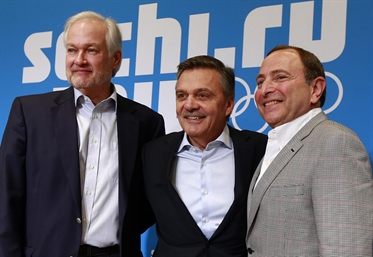Future starts soon
Future starts soon
Pleased in Sochi, discussions follow soon

 NHLPA Executive Director Donald Fehr, IIHF President Rene Fasel and NHL Commissioner Gary Bettman at the press conference in Sochi. Photo: Jeff Vinnick / HHOF-IIHF Images
NHLPA Executive Director Donald Fehr, IIHF President Rene Fasel and NHL Commissioner Gary Bettman at the press conference in Sochi. Photo: Jeff Vinnick / HHOF-IIHF Images
Rene Fasel, the President of the International Ice Hockey Federation, emphasized the outstanding conditions for athletes in Sochi’s Olympic Park. And judging from what he’s seen and heard – and what the public can see in numerous photos posted by players – it’s clear that athletes in all events are visibly happy with conditions. The compact size of the coastal cluster has been a particular boon, with players enjoying the chance to walk or cycle between the Olympic Village and their venues under the mild skies of the Black Sea resort.
The National Hockey League and the National Hockey League Players’ Association are also happy with the conditions in southern Russia.
“We are delighted to be here. Everything we see here is a terrific experience,” said NHL Commissioner Gary Bettman.
Considering the positive feedback and huge TV audiences for Olympic hockey in North America and Europe, in hockey countries and non-hockey countries around the world, it’s not surprising that there is already interest in the likelihood of NHL players taking part in the 2018 Games in PyeongChang, Korea. That would mark a 20-year anniversary since the first best-on-best Olympic men’s ice hockey tournament at Nagano 1998. But, as most expected, it’s still too early for any definite news.
“There haven’t been any discussions here and there won’t be any discussions here. We’re here to enjoy a terrific tournament,” said Bettman.
“We are here because we think it’s great to be here in this tournament and what will be for the future we need to discuss.
Continue reading“It’s about finding consensus and what makes sense for the IOC, the organizer, the IIHF, the NHLPA and the NHL. Every group has to decide what makes sense. We see international competition on the rise and we have been in discussion with the IIHF about topics including bringing back the World Cup of Hockey.”
While Bettman will need to discuss with the club owners – of whom the ones are enthusiastic about the chance of being represented on the Olympic stage and the others less – NHLPA Executive Director Donald Fehr explained what will happen on the players’ side.
“We have a process to go through after the Games and talk to the players to see what they want. They will talk with each other, with the families and share their experiences,” Fehr said.
“The reason we are here in the first instance is because this is a game with a history and a tradition of international competition and our players love representing their countries,” Bettman added. “If the players ever said they are not interested, we are never going to force them to go.”
“The players will have the final say on whether they want to come,” Fasel said. “I have a lot of respect for these players. They don’t get paid. They don’t live in hotels as many think but in the Olympic Village with other athletes. I really appreciate what the players from the NHL and in Europe do for the game of hockey and for their countries.”
How long might it take to come to a decision? NHL Deputy Commissioner Bill Daly said he expects a verdict within six months. And Bettman said it would be about the next Olympic Winter Games in Korea rather than a long-term Olympic commitment.
“The process will take as long as it takes in a democratic organization,” said Fehr, explaining the NHLPA’s view.
“I would like if it were decided as early as possible because it needs time to prepare,” Fasel said and added: “I’m very convinced that the conditions in Korea will be exceptional for the players.”
Fasel doesn’t mind these discussions every few years.
“I love to bargain with these people and have some discussions,” the IIHF President and IOC Executive Member said. “I’m so pleased that the players want to come, there’s nothing like the Olympics for the players. Nothing compares in athletes’ lives to winning an Olympic gold medal. You cannot replace an Olympic gold medal with a Stanley Cup win or the World Championship.
“For the players, including the Canadians and Americans, it has a certain value to play and win an Olympic medal. They love it. It’s not about money.”
Fasel said there have never been discussions between him and Bettman about money apart from the insurance fees that need to be covered.
Bettman stressed the long-term business relationship he has had with Fasel. “We have been working together for 20 years,” he said.
The era of both Bettman and Fasel on top of their organizations spans all best-on-best Olympics since starting for 1998 in Japan and with this past it would feel odd not to see both watching the best hockey players in the world compete in Korea in four years from now.
Asked about possible rule changes including rules on the dislocation of the goal frame, Fasel noted that changes are being processed in the usual four-year cycle. Congress delegates will vote about proposed changes for the 2014-2018 IIHF Rule Book in May during the 2014 IIHF Ice Hockey World Championship.
Women’s hockey safe
Women’s hockey has been in the spotlight since then-IOC President Jacques Rogge challenged the sport and criticized the lack of competitiveness in Vancouver 2010 with Canada and the United States dominating the game and having qualified for each Olympic gold medal game with the exception of Turin 2006 where Sweden eliminated the U.S. in the semi-finals.
Bettman said he, speaking as a hockey person, would be distressed if the IOC were to remove women’s hockey from the Olympics.
Fasel had calming words for him and the audience. “It will never happen,” he said about the risk of women’s hockey losing the Olympic status.
And he has good reasons for that confidence. Sochi 2014 might prove to be the best and most competitive Olympic women’s ice hockey tournament ever since the start in Nagano 1998. The games were more intense, more entertaining to watch, the players more athletic and the number of blow-out scores has clearly gone down.
Fasel compares this progress with men’s Olympic history.
“In the ‘30s Switzerland lost to Canada in two digits in men’s hockey,” Fasel said.
It took 82 years for the Swiss to record a first victory over the Canadians, finally breaking the hoodoo in 2006 with a 2-0 win in Turin. The countries’ first encounter, back in 1924, saw a Canadian amateur club team steamroller Switzerland 33-0. Luckily men’s ice hockey wasn’t eliminated from the Olympics despite the rough start.
“The way the women played here is much better than in Vancouver. Canada and the United States still have an advantage. We have 80,000 women playing in Canada and maybe 4,500 women playing in Finland and even less in other countries.
“We invested over 2 million Swiss Francs in the women’s hockey program since Vancouver and I hope it will be even better PyeongChang. We need some more years and patience and to work very hard but it’s getting better. The IOC is willing to give us the time. The women’s participation has not been a question,” Fasel said.
“If it’s getting better I’d like to have ten instead of eight teams [in the Olympic women’s ice hockey tournament],” Fasel added. “Maybe it’s too early for PyeongChang but maybe for 2022. The ultimate goal should be to have 12 teams.”
Back to Overview











































